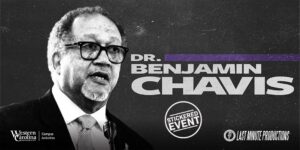
Dr. Benjamin Chavis has been part of the civil rights movement since he was 12 years old. He worked with Martin Luther King Jr. in the Southern Christian Leadership Conference, an African-American civil rights organization focused on non-violent resistance to enact social change. Chavis spoke at Western Carolina University as part of a series of events celebrating Black History Month on Thursday, February 6 at 7 p.m. in the A.K. Hinds University Center Grand Room.
At 12 years old, Chavis joined the National Association for the Advancement of Colored People or the NAACP. When he was 13, he grew increasingly interested in civil rights and worked to desegregate the library in his home town of Oxford, NC. Chavis earned his Bachelor’s degree in chemistry from the University of North Carolina Charlotte in 1969. Years later in 1971, Chavis was in Wilmington, NC to build support for a school desegregation lawsuit that was going on at the time. On one violent night, a grocery store was firebombed and Chavis along with nine others were arrested and Chavis was wrongfully convicted and sentenced to 34 years in prison. Many defense attorneys and organizations challenged the verdict, citing 2,685 errors in the trial. Then, in 1980, three of the main witnesses in the trial admitted they lied because of pressure from law enforcement. Later that same year, the court reversed the convictions.
Having learned from Martin Luther King Jr., Chavis made the most of his time in prison. He attended Duke University and earned his master’s in divinity under a study release program while in prison. Guards would escort Chavis to the college in chains in the morning and then pick him up and take him back to the prison in chains in the afternoon. After spending 8 years in prison, Chavis went on to earn his doctorate in divinity from Howard University.
Chavis is now the president and Chief Executive Officer of the National Newspaper Publishers Association as well as the president of the Education Online Services Corporation which provides online education services to historically black colleges and universities in America and around the world. He is also the president and CEO of the Hip-Hop Summit Action Network.
Since the speech was part of Black History Month, Chavis spoke about the importance of celebrating the achievements of African Americans and their importance in American history. He said that while America has made progress, there is still a long way to go. According to Chavis, America needs more equality and less polarization. Activists today should work toward equal justice for everyone.
“The best way to celebrate Black History Month is to make some more history,” said Chavis. As an activist himself, Chavis encouraged students to take action to make progress happen.
Chavis urged college students to take what they learn in college and use it to make a difference in the world saying, “Universities are where minds are being shaped and consciousness is being challenged.”
Getting involved in social movements is a key part of this. While some people say that young people should not be involved in movements, Chavis argued that young people are almost always the leaders of movements. He said that being involved in movements shapes who students will be in their careers.
Chavis also talked about current problematic policies in the U.S. and potential solutions for these problems. He argued that politicians running for office should be running to help more people have a better quality of life. This includes addressing problems like gentrification, the minimum wage, higher education and healthcare. Chavis said that the United States’ policies on these issues now exclude certain groups of people and they need to be more inclusive.
At the end of the speech, Chavis answered questions from the audience. One audience member asked how to get people to get involved in political movements. Chavis emphasized the importance of diversity and inclusion again.
“It’s not about what you do with people who are like you, but people who are not like you,” said Chavis.
Another audience member asked how America should fix its prison system. Chavis argued that we need to start with more humane treatment of prisoners. He referred to the prison system as “institutionalized inhumanity.” Chavis said that the people who run the system are the ones who need to be corrected.
Western Carolina is hosting several more events as part of Black History Month. On
Thursday, Feb. 20, the Associate Dean of the College of Education at the University of Georgia, Anneliese Singh, will give a presentation on strategies people can use to achieve racial justice and collective healing. On Wednesday, Feb. 26, “Afro-LatinX Dialogue” will discuss the issues and struggles of identifying with multiple cultures.






